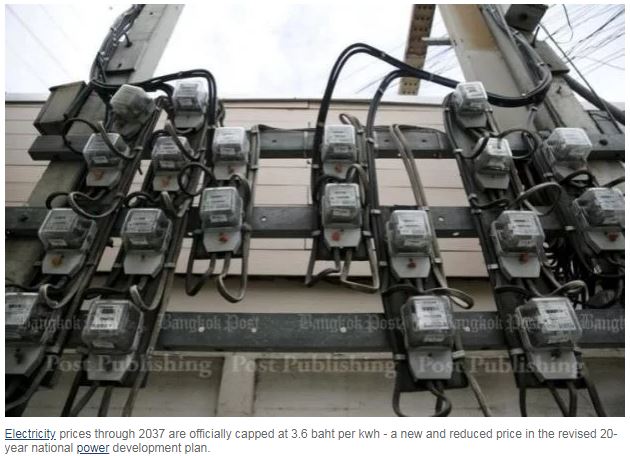Thailand: Power bills set to drop
Energy policymakers are planning to cap the power tariff at 3.576 baht per kilowatt-hour (unit) under a new version of the national power development plan (PDP), with the expectation of maintaining consumer power bills for 20 years, says Kulit Sombatsiri, permanent secretary of the Energy Ministry.
The previous version of the PDP caps the tariff at 5.55 baht per unit. The PDP is the country’s master plan that attempts to match power demand and supply.
The plan is revised every couple of years to reflect the country’s economy and technology, as well as the popularity of independent power supply.
Yesterday the ministry held the last public hearing for the new PDP in Bangkok after four rounds in major provinces.
Policymakers plan to finalise the new version by the end of 2018 before submitting it to the National Energy Policy Council and cabinet, both chaired by Prime Minister Prayut Chan-o-cha.
The effective time frame of new PDP is set until 2037.
 Mr Kulit said the new tariff at 3.576 baht per unit is calculated based on the average price of liquefied natural gas (LNG), which stands at 244 baht per million British thermal units.
Mr Kulit said the new tariff at 3.576 baht per unit is calculated based on the average price of liquefied natural gas (LNG), which stands at 244 baht per million British thermal units.
The new version will rely on natural gas for 37-53% of the country’s power generation. The plan will trim down power from coal or lignite and hydro from overseas.
“We project there will be new supply of LNG in global markets, making prices decline,” he said.
“Reliable power capacity below 40,000 megawatts [MW] during 2018-25 will be enough to serve the consumer demand without new power plants. Demand will gradually increase from 2026 onward to reach 50,000MW by 2037 while the reliable capacity will decline to 27,000MW. The country will need more new power plants.”
Nonetheless, Wattanapong Kurovat, deputy secretary-general of the Energy Policy and Planning Office, said the plan aims to have new power generation projects from 2023- 32 with a combined capacity of 6,000MW.
The new capacity, excluding renewable power, will be allocated to the state-run Electricity Generating Authority of Thailand (Egat) and private companies to run independent power producers (IPPs).
“Egat will control the country’s core power generation, while IPPs will cover for peak-load power supply,” said Mr Wattanpong.
Several energy experts have criticised the plan for making the power tariff heavily dependent on LNG imports, which come at a high cost and will raise power bills if prices fluctuate in the same way crude oil does.
Many have reasoned nuclear power should be put on the new PDP, as nuclear accidents are caused by old technology, but nuclear plants using new technology have not had leakage accidents.
Montchai Rabruentaweesuk, an independent engineer, said the PDP planner depends too much on LNG prices being stable, a projection that is highly uncertain.
He said the withdrawal of coal-fired and nuclear power plants from the PDP is putting the country’s power sector at risk.
“The policymakers can balance power resources and interruption cases, and they should come to an understanding with locals and protesters,” said Mr Montchai.
Arthit Vechakit, a representative from the Federation of Thai Industries, said the private sector also disagrees with overdependence on LNG imports, as the country has a surplus of agricultural waste products that could be used to generate energy from biomass.
Source: https://www.bangkokpost.com/business/news/1596030/power-bills-set-to-drop


 English
English




